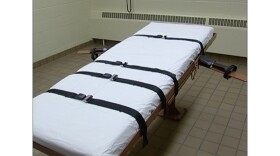Anti-death penalty advocates are reacting to comments from Gov. Mike DeWine, who said in an Associated Press interview that lethal injection “appears to us to be impossible from a practical point of view”.
DeWine stopped executions after he took office last year, after a federal judge found Ohio’s lethal injection method to be cruel and unusual punishment.
Abe Bonowitz with Death Penalty Action is cautious about DeWine’s comments: “I believe the governor is exhibiting leadership. He hasn’t gone as far as he might have had to because of the lethal injection hangup.”
But Bonowitz also said he thinks DeWine’s decision not to allow lethal injections isn’t just because a federal judge ruled Ohio’s method was cruel and unusual punishment last year.
“He also knows full well that the recommendations of the Supreme Court task force on the administration of Ohio’s death penalty need to be implemented before anybody can be executed who would not have been on death row had those recommendations been there," Bonowitz said.
DeWine said there’s now an unofficial moratorium on executions because of the state’s inability to find the drugs needed to carry out the only death penalty method allowed under state law. And DeWine said lawmakers would need to change that. But Bonowitz is holding out for a bill banning executions of people with severe mental illness, and another that would end the death penalty entirely.
The last person to be executed in Ohio was Robert Van Hook, who died by lethal injection on July 18, 2018.






